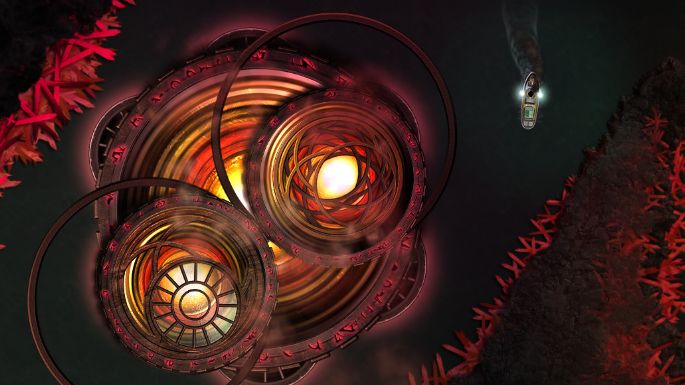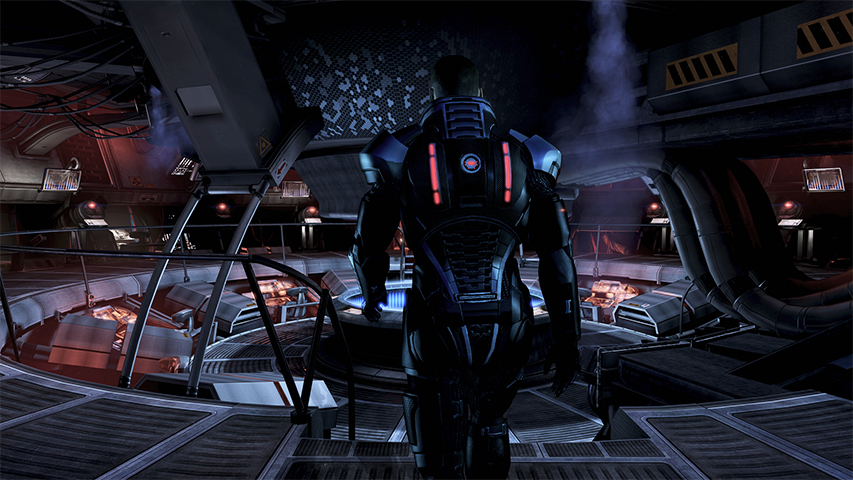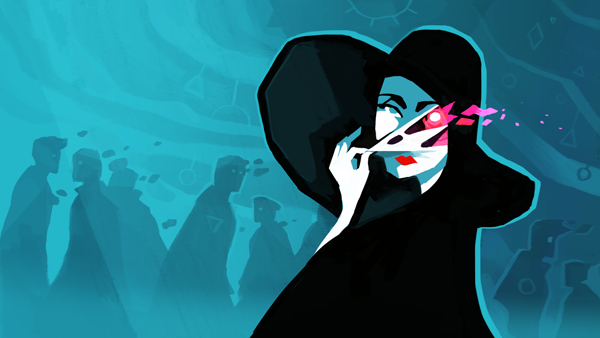Failbetter co-founder Alexis Kennedy on indie storytelling and guest writing for BioWare
Kennedy's writing credits already include Fallen London, Sunless Sea and Stellaris.

Shortly after parting ways with Failbetter Games—the studio he founded in 2010 —earlier this year, Alexis Kennedy announced his next steps would see him sent spaceward, writing new material for Paradox's 4x-meets-grand strategy game Stellaris.
At the time, he described the move as "exactly the kind of thing" he hoped to be doing after venturing into the world of freelance, and it seems things are looking brighter still for the Fallen London and Sunless Sea mastermind, if his latest blog post is anything to go by. BioWare is Kennedy's next stop, a move which sees him become the developer's first ever guest writer.
I spoke with Kennedy about his latest direction, what makes for good videogame writing, and how adaptable and transferable different writing styles are to different videogame genres.

Alexis Kennedy founded Failbetter Games in 2010, where he championed the browser-based choose-your-own-adventure Fallen London and survival/exploration RPG Sunless Sea. He announced his departure from Failbetter earlier this year to pursue freelance projects—the first of which would be Paradox's Stellaris. Next, he will be guest-writing for BioWare.
PC Gamer: Firstly, congratulations on your next step. Can you tell us any more about what you’ll be doing with BioWare next year?
Alexis Kennedy: Thank you! And oh, God, I wish I could, but you know how it is in AAA land. I suspect there's enough clues for people to connect the dots anyway. I can say that I'm going to be starting there early next year, it'll be six months or more, and my job title is going to be something like 'senior writer'. I wanted it to be 'THE ENGLISHMAN' but I don't think EA will wear that.
You mentioned in a previous email that BioWare doesn’t normally use guest writers—how were you approached and what was your initial reaction?
We've worked together before—I did some narrative consultancy for them at Failbetter, and worked on a Dragon Age project. So it was pretty informal. Mike Laidlaw just DMed as soon as he heard I was going freelance. I've just looked up my response, I can truthfully say it was
Keep up to date with the most important stories and the best deals, as picked by the PC Gamer team.
"Alexis Kennedy: er YES
Alexis Kennedy: sign me the FUCK up
Alexis Kennedy: Please"
And I know that in this industry everyone is always supposed to say how excited they are to work with whoever they’re working with. But I am in the fortunate position of only having to take the contracts I want, so if you hear me say I'm excited, I genuinely am bloody thrilled. BioWare are world-class talent and good people with it, and their work has been a major influence on my own.
In some of the talks you’ve held in the past, you’ve spoken of how slow-burning, semi-immersive stories are of particular interest to you. This ethos is clearly mirrored in Fallen London and Sunless Sea, and in many respects transfers to the 4X/grand strategy genre. With Stellaris, how much of that writing style and/or approach is transferable?
Loads! A couple in particular.
In Sunless Sea as in Stellaris, every time you present a snippet of story you have the player's attention for a sliver of time, and you have to respect that. Every word needs to pull its weight. That doesn't mean you always write short (although that's a pretty good rule) but it does mean you can't fart about. Get in late, leave early, keep the rhythm of choices going. You want people to feel that each time they get to another chunk, it's a fun detail or legit plot beat that's fun to read, not another piece of homework. Story is like water. It's essential, but you don't want to drown in it.
And you need to leave space for what the player wants and thinks—without abandoning them to their own devices. I always talk about 'fires in the desert.' The story points you provide are like little stops beside a camp-fire in the night, where you and the player know exactly what's going on. But how the player gets from one of those fires to another, and what it means to them, is up to the player, not you. What happens out in the desert night of the rest of the game belongs to them, and you need to leave your stories open to that.

On that point, are you able to say what sort of stuff you wrote for Stellaris—not necessarily specifics, but was it for mid-late game scenarios, for example?
What I’ve done is an interactive novelette-sized set of linked events—I’ve described the flavour as ‘Event Horizon meets the Twilight Zone’. It can begin relatively early, it'll take a while to unfold, you probably won't reach the end until the late-ish game.
Failbetter’s games are also very text based, and much of their narrative unfolds via a combination of words and player imagination. This is perhaps tied to financial constraints, however BioWare games like, say, Mass Effect, are obviously very different. How do you adapt your writing style to suit a game not necessarily bigger in scope, but certainly bigger in production value?
There are still constraints—they're just different ones. Years ago, when I did a talk at BioWare, I said that the nice thing about text is that it’s cheap. Then one of the people who’d heard the talk said afterwards, well, you know, for us it’s not always cheap, because if a line needs changing, you can’t just get voice talent back into the booth to say one line.
Or, again, I could just decide in Fallen London that what we really wanted was an owl that opened on a hinge and drank your memories through its internal maggots. And Paul would patiently get on with making an icon for it, and it would take him half a day and then we could put it in the game. But in a big game where everything is 3D and animated and it takes people a year to make all the rocks, they probably don't have time to hinge the owls.
So any work I do on a big game will have fewer casually lunatic inventions, especially since it has to fit in someone else's lore anyway. That means focusing on lurking menace, tight dialogue, and opportunities to do things you’ll regret. Which sounds like fun.
Speaking generally, are there ever any golden rules/common guidelines with regards to how writing works differently for differently genres?
The most important uniquely game-y thing is that the narrative, and the rest of the game, should reflect and respect each other. That can mean that there are story choices that have narrative consequences in the gameplay—like in a BioWare or a Failbetter game. But it can also mean that the art direction and the narrative and the main game verbs are thematically aligned—like in Darkest Dungeon, which has a linear and minimal plot that still sits faultlessly with the rest of the game. It can mean that the game creates lots of interesting little half-stories that the player can then make sense of in their own narrative—like Crusader Kings or Dwarf Fortress (Sunless Sea does this, too).
You can just plaster a story over a game, and if it’s a great story executed well in a traditional way, that can still work well. But it’s a missed opportunity.

I’ve heard you say in the past that frugality is under-utilised in games. Why is that so important to you as a writer?
Steven Donaldson writes those giant fantasy bricks about a regretful magic leper. There’s lots of good stuff in there, but my God they’re bloated. His short stories, though, are really tight. And he said once that if you’re writing a novel, you can just hose someone down with words, and some of the words will stick. But if you’re writing a short story, you have to stand up close and apply the words carefully, as if you’re tucking them into the reader’s pockets.
Game writing should be more like short stories than novels. Text is quite easy to produce in quantity. It’s tempting to use this as a brute-force way to create length or variety of player experience. But this is a vicious circle—if you just produce more text without applying it carefully to the game experience, you teach players to skim it, and then they expect even more.
This is doubly true because if you’re producing very large quantities of text, the quality will inevitably fall off, and players won’t savour it so much; and because as a discipline, interactive writing is still in the shadow of linear fiction writing, and it’s not unusual for a game writer to imitate a novelist. More is not always better.
Leaving Failbetter behind, after having seen it grow from a one-person outfit to what it is today, must have been difficult for you—was the decision to leave your biggest career challenge to date?
I got into this business because I wanted to work in the space between writing and game design. That is my obsession and I want to spend the rest of my life learning to be as good at it as I can be. That means experimenting and innovating and working with a variety of people.
I could literally have fired half the team and said NOW LET US PURSUE MY NEW CREATIVE DESTINY. But that wouldn’t have been nice.
Alexis Kennedy
Failbetter had grown big enough that I was doing increasingly less writing and design. And also, Failbetter is built to make a particular kind of game. I built it that way, and I think those games are great, and the people who work there now are great at making them. But it had been seven years, I wanted to do something different. I mean, I owned the company, and I could literally have fired half the team and said NOW LET US PURSUE MY NEW CREATIVE DESTINY. But that wouldn’t have been nice.
So yes, it was hard, and when I die and they open me up they will find the Failbetter backwards F running all the way through me, like the letters in a stick of rock. But this way means I can go off and do my own thing as Weather Factory, and Failbetter continues to be a thriving happy community. They’ve got the first Sunless Sea expansion coming out next month, and I predict it is going to be big wonderful complicated and beautiful like a clockwork gorilla.
And I’ve already started on the first of my daft narrative experiments. It’s a game called Cultist Simulator—a narrative-crafting hybrid where the aim is to find inventive ways to doom yourself and the world. I’ve been working with Catherine Unger, the artist who did all the assets for Harry Tuffs’ wonderful A House of Many Doors, and the stuff she’s producing is making people cry. It’s simultaneously very Failbetter in tone and absolutely not the kind of game I would have got to make at Failbetter. There’s a simple Javascript prototype up right now [here], and with luck I’ll have a Unity alpha out by the time I go off to do the BioWare thing.

Thinking back to when you first started out with Failbetter, when Fallen London was still known as Echo Bazaar, how has your outlook changed towards writing for games, if at all?
I understand a lot more now that whatever writing goes into a game is a patchwork Frankenbeast of difficult production decisions, late rewrites and compromises because of technical constraints. And I understand how much more there always is to learn. Every time I think I’ve grasped a DEEP SECRET of how to write, it turns out to be a little more complicated than that.
As videogames as a medium continues to grow and explore more serious, interpersonal themes, how does the future look for narrative-led, dialogue-heavy videogames?
When I started Failbetter in 2009, there wasn’t anything like Fallen London or Sunless Sea, but there was also no Walking Dead, no Gone Home, no 80 Days, no Lifeline, no Stanley Parable, no Firewatch, no Oxenfree, no Papers Please, no Digital: A Love Story, no Undertale. Now all of those were indies doing something innovative, all of them were successes because of distinctive, effective narrative and dialogue, and all of them worked as games. It was game-native writing, every time. And in the big AAA tent-pole successes, the ones that could just hide behind production values—there too, the quality keeps going up, year on year—not reliably, but as an industry we keep getting better. I think a lot of that is down to the indie scene and the vitality of the cultural fringe. But I’m an indie, so I’m biased.
As a writer, what would you like to see more of writing-wise in games across all genres?
I’d like to see more games writing respect the intelligence of players. I don’t mean it necessarily has to be high art. This is the age of The Sopranos and Game of Thrones. You can do things that demand the audience’s total attention and if you do it right, they’ll love it. But I play too many otherwise excellent games that explain the main plot to me every ten minutes, or have characters come up to me and give long speeches carefully explaining their detailed history and motivations in case I miss the point.
I know sometimes people play games to switch off, not be challenged—sometimes I’ll be one of them. But there will always be plenty of games that let you switch off. If you’re making a narrative-led, dialogue-heavy game, it shouldn’t be one of them. I understand that devs (or execs) get nervous that if they don’t spoon-feed their players the story, they won’t pay attention to it. But that’s backwards! If people don’t care about your main quest, it’s no use explaining it with flash-cards and diagrams—the answer is to make a main quest that people care about.
Of course I know it’s often not that simple—for example, that some devs set out to do exactly that, and the story gets cut up in production and then over-explained because testing shows that people are confused. But sometimes it’s a matter of not trusting the audience enough, or expecting them to stand still for your bullshit. And I think the audience is more sophisticated every year—this is why we’ve been able to sustain such an explosion of intelligent narrative experimentation. So I am cheerfully convinced we’ll get there.

